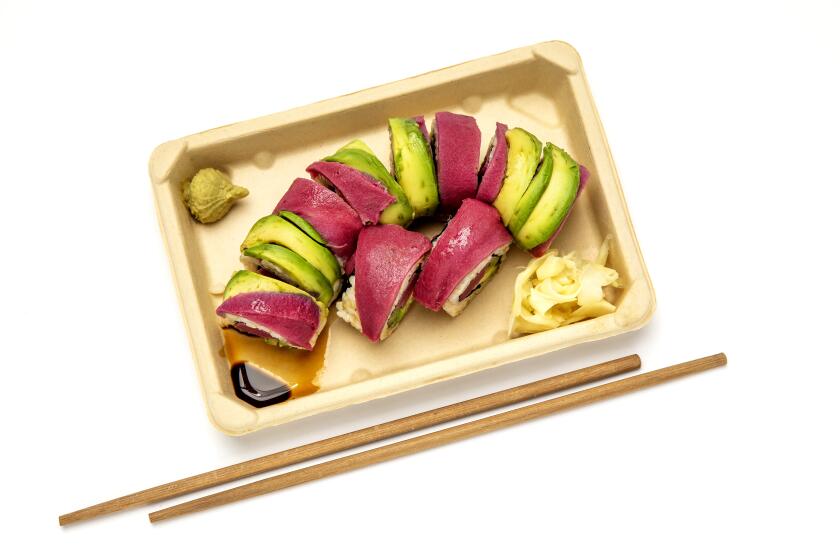Beyond the burger: chicken, fish and pork are now made from plants
- Share via
This story is part of our series on the future of cultured and plant-based meat. Read more here.
Consumers were clear: When it comes to plant-based alternative proteins, they preferred ahi tuna sashimi that’s a darker shade of red than what you might find in real life. So, Jacek Prus and his Kuleana co-founder, food scientist Sònia Hurtado, upped the radish-derived red coloring. When consumers wanted a “fishier” taste, they dressed their bamboo fiber and potato starch ahi with algae oil and finished it with a touch of koji fermentation.
Like all alt-proteins, the nutrients in Kuleana’s tuna can be calibrated, and Prus and Hurtado increased the iron content to 100% of the daily requirement to give it a health advantage. The resulting product from the San Francisco-based company is available in $12 tuna rolls at select California Erewhon markets and $14 tuna bowls at select Poké Bar outlets. Kuleana’s next product? Salmon.
Although the alt-protein movement is famous for replacing beef in burgers, there now are plant-based products that mimic an expanding variety of fish, as well as chicken and pork. About $2.6 billion has been invested in companies focused on plant-based meat worldwide in a six-year period ending in September 2021, and young innovators are pushing the movement forward.
(To keep up with the new kids, alt-protein standard-bearers Beyond Meat and Impossible Foods continue to launch new and improved iterations of their burgers and sausages. Both recently launched new chicken bites.)
The list of meat mimics — plant-based, cultured, fungi-based — is mushrooming.
As an undergrad — and novice vegan — at the University of Texas at Austin, Prus helped with an overhaul of the university’s food service that put vegan offerings in select cafeterias. “It was cool to do,” he says.
After earning his MBA at UT, Prus went to Berlin to help build ProVeg, a German business incubator that fosters alt-protein startups (including Kuleana). A subsequent spin through Y Combinator, Silicon Valley’s granddaddy of all tech incubators, led to investments totaling $6.5 million from sources including Kyle Vogt, co-founder of Cruise Automation, a driverless car company, and Reddit co-founder Alexis Ohanian.
In three years, Prus, 28, has become a leader in plant-based seafood. Today, Kuleana is manufacturing at a “pilot production level,” according to the company, but Prus says its production plant under construction in San Francisco will be able to produce 200,000 pounds of plant-based fish a month by spring 2022.
Hong Kong-based OmniFoods’ plant-based pork arrived in Los Angeles — its first U.S. market — in July. It’s sold in Sprouts and Whole Foods markets.
David Yeung, founder of the alt-protein powerhouse, echoes the words of almost every entrepreneur who specializes in alternative proteins. Industrial animal agriculture is an environmental and health problem, he says, adding: “We try to really wake people up in terms of what they’re eating when they eat meat.”
He plans to launch an OmniFoods plant-based seafood line here next year. “L.A. is the epicenter of plant-based penetration,” says Yeung. “A lot of people are health-conscious, are progressive, highly concerned about climate change and the environment.”
His plant-based pork uses non-GMO soy, mushrooms and rice, “all natural ingredients,” he says. “This is not just a transaction. This is about impact.”
Like so many entrepreneurs in this movement, Prus and Yeung are mission-driven vegans. But Big Meat is all in as well.
Tyson Foods, which is one of the world’s largest producers of industrial meat and reported $43.2 billion in revenue in 2020, is bullish about alt proteins, according to David Ervin, vice president for “emerging proteins.” Those proteins include Tyson’s Raised & Rooted pea-based plant burger ($5 for an 8 ounce package at Ralphs) and plant-based chicken nuggets ($5 for an 8 ounce package at Target).
Tyson, based in Springdale, Ark., also is launching alt-protein versions of its meat brands. “Jimmy Dean has a plant-based breakfast sandwich,” Ervin says, adding, “Tyson follows the consumer. We intend to be the leader across all proteins.”
We tried more than 25 alt-protein burger, sausage, chicken nugget and fish products. Here’s a breakdown of the best and worst
Andrew Ive is the founder of Big Idea Ventures, which manages alt-protein investment funds with hundreds of millions of dollars and operates startup incubators in New York, Paris and Singapore. From the start, Ive says, the alt-protein movement has been led by a group of venture investors concerned with animal welfare and climate change. But he’s been watching Big Meat increase its involvement both by funding ventures and by developing in-house alt-protein brands.
Investment funds are flowing both “from Tyson Foods and from those trying to bring an end to Tyson,” Ive says. “Eventually, the winners will be acquired.” The big companies, he notes, “have marketing, scale and distribution.”
More to Read
Eat your way across L.A.
Get our weekly Tasting Notes newsletter for reviews, news and more.
You may occasionally receive promotional content from the Los Angeles Times.











